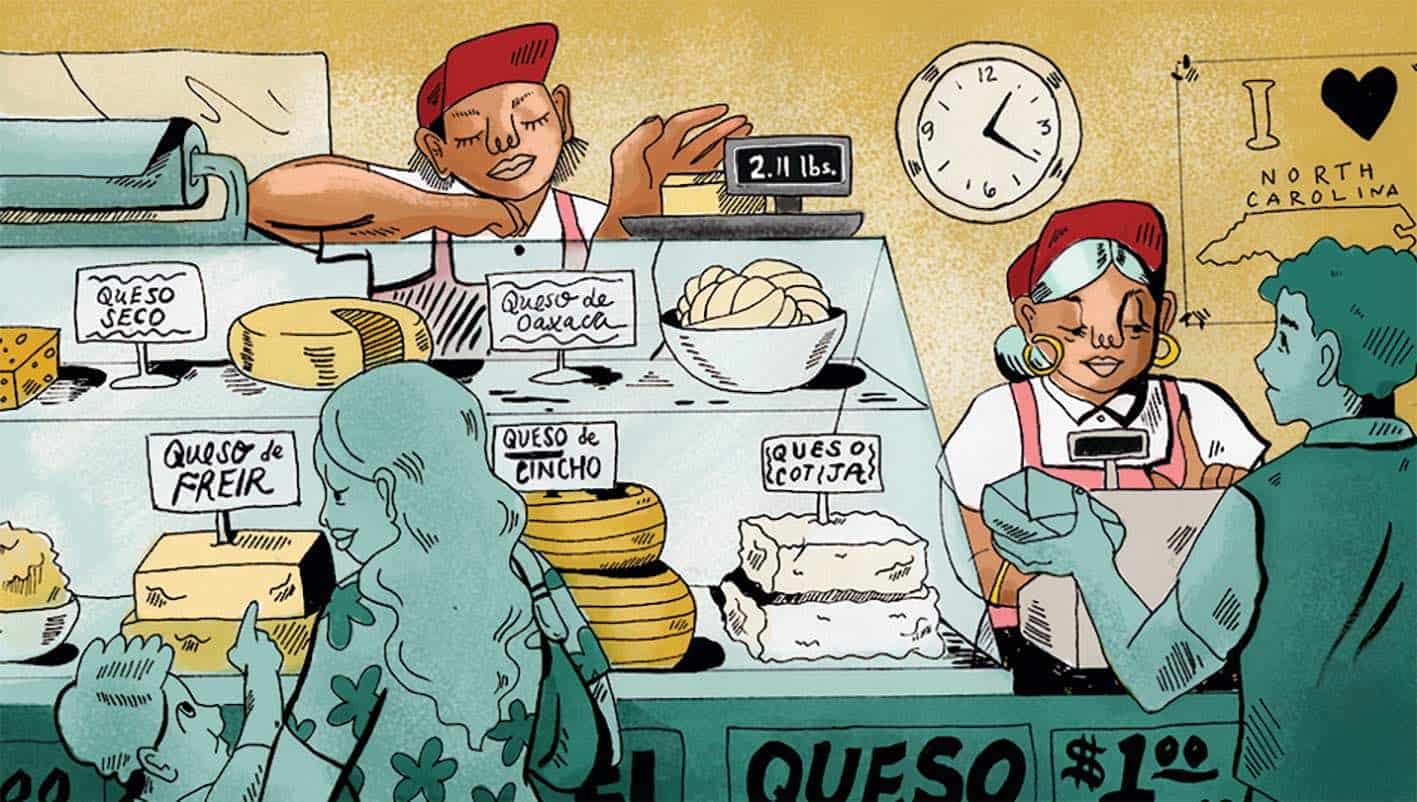
Illustration by Sonic Yonix
Statesville, North Carolina is the definition of “small town America.” Spanning just over 24 square miles, outsiders would never consider the Iredell County seat a melting pot—but the dairy aisles of its modest markets tell a different story. Latinos make up the largest ethnic minority in the country, and the American South has the fastest growing Latino population of any region in the United States. North Carolina routinely ranks as a state with record-breaking Latino growth. For years, its food processing and manufacturing industries have drawn newly-arrived immigrants looking for work. Small towns like Statesville are impressively diverse, with communities from Mexico, Venezuela, Colombia, and Nicaragua.
Right downtown, across from the Statesville courthouse, you’ll find El Reposo, a Colombian eatery and grocery store. Set in a cramped trailer, space is limited—but a cooler is packed to the brim with a diverse mix of cheeses. There are fat rounds of crumbly queso fresco and bags of ubiquitous grated cotija—a salty, aged cheese that is Mexico’s answer to parmesan—alongside bricks of queso duro viejo, a hard, aged cheese from Nicaragua with a salty bite.
As the demographics have shifted, so have the markets. Look closer in the cheese case at El Reposo, and you’ll now find cuajada, a soft, milky fresh cheese from El Salvador. The number of asylum seekers worldwide from Northern Triangle countries—El Salvador, Honduras, and Guatemala—increased five-fold between 2012 and 2015. Many of them are seeking asylum after fleeing areas rife with gang violence, drug trafficking, and corruption in the poorest nations in the Western Hemisphere.
On the outskirts of Statesville, you’ll find Tienda Y Tortilleria Teresita. Launched as a small Mexican market and tortilleria in 2015, the spot offers cheeses made in-house like queso fresco and queso Oaxaca, Mexico’s semi-hard melting cheese, often used in quesadillas. The market has expanded over time to offer products from Central America and South America.
Teresita’s dairy section is a study in underappreciated Latin American cheeses: There’s the salty and stinky queso de cincho from Mexico; multiple brands of queso de freir, a semi-firm cheese that can be griddled or fried like halloumi; grated and powdered cotija; fresh, milky cheeses from Honduras; queso seco for Colombian arepas; El Salvador’s queso arrocero, aged for more than 60 days and queso poroso, a soft cheese with a pockmarked appearance. The list goes on and on, reflecting the diverse needs of Statesville’s ever-growing immigrant community.
Along with these rural marketplaces, North Carolina’s major cities, including Charlotte, Greensboro, Durham, and Winston-Salem, are also sites for the Latino-owned grocery store chain Compare. First launched in New York in the 1980s by Eligio Peña, an immigrant from the Dominican Republic, Compare’s stores have a veritable wall of Latin American cheeses, reflecting the store’s surrounding immigrant communities, whether they’re using the cheeses to make chile rellenos, pupusas, or baleada.
Throughout my four years in North Carolina, I’ve rarely seen white Americans in the aisles of these grocery stores, and it’s a shame. Immigrant-owned businesses have the power to open entirely new culinary worlds in American kitchens. And digging into an unfamiliar dairy case is more than a culinary adventure: It’s a way to get to know your neighbors.




